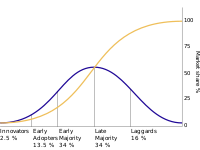
Photo from wikipedia
Abstract Technology diffusion is a necessary but not sufficient condition for knowledge diffusion. Technological waves' impact on education differs across educational levels. We use data for 104 countries on technology… Click to show full abstract
Abstract Technology diffusion is a necessary but not sufficient condition for knowledge diffusion. Technological waves' impact on education differs across educational levels. We use data for 104 countries on technology diffusion and education from 1870 to 2019. We find six technology waves from 1870 to 2019 had a substantial and statistically significant educational attainment impact using fixed panel data modeling. The impact differs across time and regions, with the most noticeable impact in Advanced economies and Eastern Europe. Asia and the Pacific, Latin America and the Caribbean, Middle East, and North Africa are catching up with lagging Sub-Saharan Africa. The transportation revolution increased the average years in primary and secondary education. Telecommunications affects college and graduates' schooling. IT waves show a focused impact on tertiary education, like the health technology revolution (health wave having a significant impact on secondary education). Steel production (oxygen blast furnaces) shows no knowledge spillover effect. The invention of electricity is the one to spark knowledge diffusion by increasing average primary schooling by 3.47 months (1930–1950).
Journal Title: Technology in Society
Year Published: 2021
Link to full text (if available)
Share on Social Media: Sign Up to like & get
recommendations!